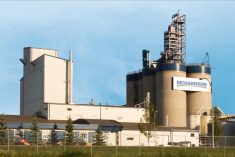The U.S. Center for Food Safety says neonicotinoid seed treatments offer minimal yield benefits and cause “widespread environmental and economic damage.”
In a report released this week, the environmental advocacy organization said it reviewed 19 published studies on the potential yield benefits of neonicotinoid seed treatments, which are applied to nearly every corn, canola and soybean seed in North America.
The study’s authors said eight studies found neonicotinoid treatments did not provide any significant yield benefit, while 11 studies showed inconsistent yield benefits.
“What we learned in our thorough analysis of the peer-reviewed science is that (the) claimed crop yield benefit is largely illusory, making their costs all the more tragic,” said Peter Jenkins, report co-author and Center for Food Safety attorney.
Read Also

NFU says proposed plant breeders’ rights come at farmers’ expense
The National Farmers Union is pushing back against changes to the Plant Breeders’ Rights Act that would narrow the scope of farmers’ right to save seed or propagate crops from cuttings and tubers.
Christian Krupke, a Purdue University entomologist and Jonathan Lundgren, a U.S. Department of Agriculture entomologist, acted as reviewers for the study.
Krupke has conducted several field studies looking at the yields of corn treated with neonicotinoids versus corn that received no treatment.
After evaluating yields, stand count and root damage from two years of data, Krupke said in 2013 that the findings are clear.
“Across the board we found no differences, no statistical difference in any parameter at any location,” from field trials conducted in Indiana, he said.
“The data looked liked a normal distribution, if there was nothing (no insecticide) on there.”
The report authors said the widespread use of neonicotinoids, as an insurance against crop pests, has made integrated pest management obsolete. Farmers should only apply pesticides “if economic damage thresholds are exceeded,” but neonic seed treatments are used if insects are a threat or not.
The Centre for Food Safety said the prophylactic application of insecticides is a practice that should be terminated. It is not cost effective for farmers and undermines integrated pest management principles.
The authors want the Environmental Protection Agency to suspend the registrations of all neonicotinoid seed treatments until the true costs and benefits are fully understood.
The American Seed Trade Association responded to the study, arguing neonicotinoid seed treatments provide value to growers.
“There are several factors that farmers consider as they strive for a healthy sustainable field, many of which are out of a farmer’s control. However, using certain agrichemical products, such as neonicotinoids as a seed treatment, can guard against insect or disease damage during a plant’s most vulnerable developmental stages and help maximize the performance potential of each seed.”

















